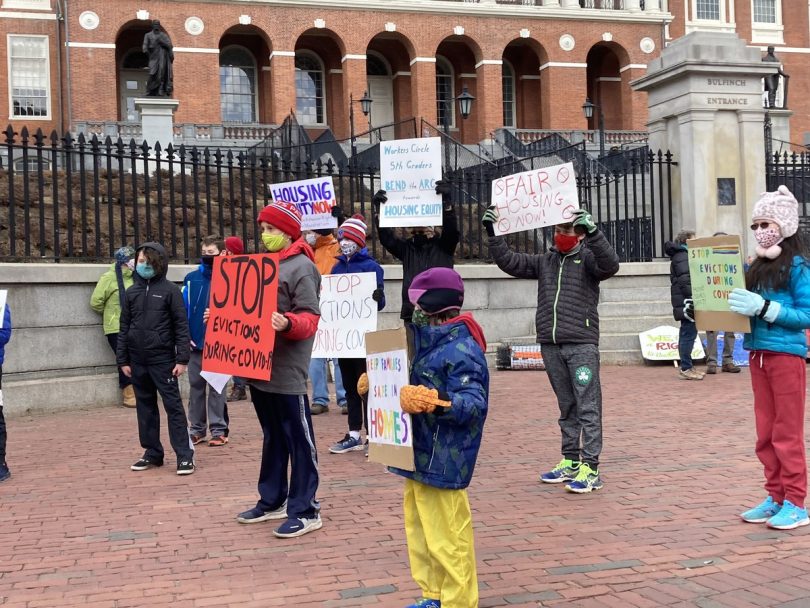By Alex Scheinberg
Boston University News Service
BOSTON — A dozen fifth grade students rallied outside of Beacon Hill Sunday, calling for state legislators to stop evictions and support protections for struggling renters and homeowners during the COVID-19 pandemic.
The rally, which took place on the heels of the one-year anniversary of the COVID-19 emergency declaration of March 13, brought approximately 50 people together and included a 20-minute street theater performance in which the rallying students expressed their concerns over the state’s eviction policies.
Adia Bhargava, a fifth-grade Somerville student with Boston Workers Circle, stood at the front of the other students as she answered questions from reporters.
“I go to school in a community with people who don’t get hired for jobs with high pay, so they may not be able to pay the rent all the time,” Bhargava said. “When everything shut down, some lost their jobs, got paid less, or couldn’t work as often. [These people] might not even be able to pay their rent anymore.”
Young individuals like Bhargava are noticing the struggles many adults are facing throughout the pandemic, sparking involvement among the youth.
“Today, the youth are involved because, exponentially throughout the state, we are seeing families that are at risk of being evicted and foreclosed on,” Gabriela Cartagena, an organizer with City Life/Vida Urbana, said. “Our youth are part of that equation.”
While there have been measures taken to alleviate the stressors many individuals face during this unprecedented time, many argue it is not enough.
“The CDC moratorium is not enough,” Cartagena said. “Right now, we have hundreds of thousands of families that are at risk of a no-fault eviction.”
Since the state moratorium on evictions expired on Oct. 17, 2020, housing courts across the state have executed 1,577 eviction cases for non-payment of rent, including 70 evictions in Suffolk County, according to records from the Massachusetts Trial Court Department of Research and Planning.
3,738 summary process cases were filed statewide in December alone. The overwhelming majority of cases cited non-payment of rent as the primary complaint.
In their street theater performance, the students demanded support for House bill HD.3030. They chanted “housing is the cure” and “pass the bill.”
The bill, presented by Reps. Frank A. Moran, D-Lawrence and Kevin Honan, D-Brighton, aims to prevent COVID-19 evictions and foreclosures by expanding rental assistance programs for renters and homeowners whose ability to pay rent or mortgage has been affected by the pandemic by no fault of their own. The bill currently has 28 initial cosponsors and was also filed in the Senate as SD.1802 by Sen. Patricia Jehlen.
“As someone that was seeking rental assistance from RAFT, I know that these programs are not functioning properly,” Kimberly Landaverde, a high school senior from East Boston and an intern with City Life/Vida Urbana said. “That’s why I am here today because HD.3030 ensures that the programs can protect tenants and give them the assistance that they are looking for, as well as homeowners.”
Many homeowners have experienced difficulty finding rental assistance.
“There are people that have applied since June 2020 who haven’t even heard back from these agencies,” Cartagena said. “The bill will force the state to improve rental assistance programs that are currently broken and failing.”
The impacts of the pandemic and the difficulties many families have faced getting rental assistance are severe. Many families are in need of assistance now.
“It has been over a year since families have seen a paycheck,” Cartagena said. “Now we need more help from everyone [to] support to pass the Act To Prevent COVID-19 Evictions and Foreclosures And Promote An Equitable Housing Recovery.”
Statewide unemployment records identified 354,690 unemployed workers between January and December of 2020. This is a significant increase when compared to 109,500 unemployed individuals between December 2018 and December 2019.
Suffolk County, which includes the entire City of Boston, showed a 10.6% unemployment rate in 2020, according to data from the Economic Research Department of the Department of Unemployment Assistance. Hampden County and Barnstable County saw the highest unemployment rates in Massachusetts, with Hampden County seeing an 11.4% unemployment rate and Barnstable County coming in at 11.2% unemployment.
“It’s nobody’s fault that, nationwide, thousands and millions of people face unemployment,” Cartagena said. “We need the bill now.”





